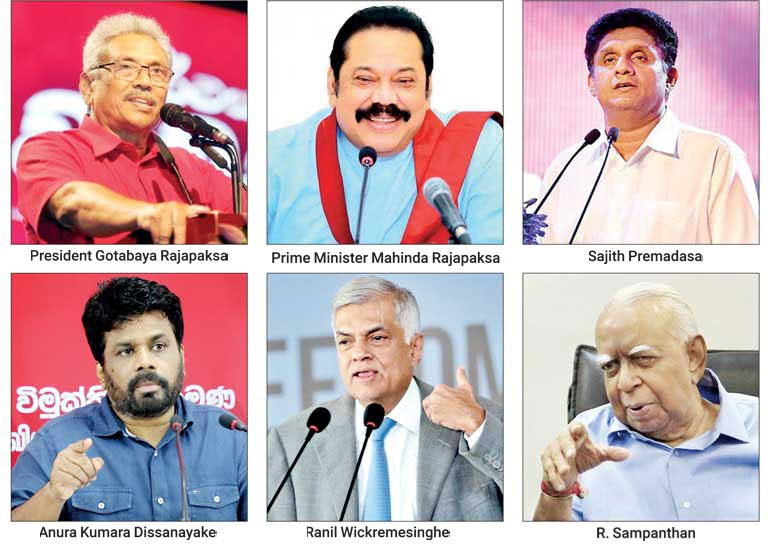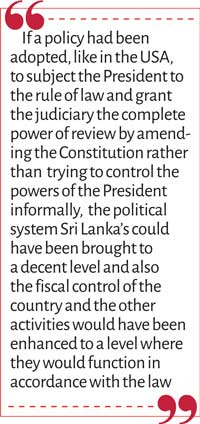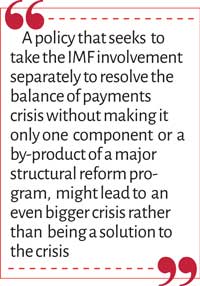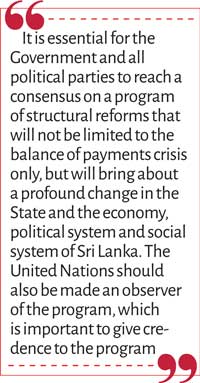Monday Feb 16, 2026
Monday Feb 16, 2026
Friday, 1 April 2022 00:00 - - {{hitsCtrl.values.hits}}

The Government still does not seem to have reached a firm decision on the strategic approach to be adopted to control and overcome the crisis facing Sri Lanka. Yet, the Government had deployed an informal program to overcome the crisis by alleviating the intensity of it before it decided to approach the IMF. The Government also had a group of people who worked untiringly on that program believing that it would work successfully. But it proved to be a utopian program that exacerbated the crisis, rather than being a realistic or pragmatic program. It was only after incurring a huge cost and the crisis having gone too far that the Government realized that the program it followed was a big mess. In the end, the decision reached by the Government to let the dollar float and approach the IMF was not a step taken willingly. In view of the anti IMF policy which the Government had followed so far, even the officers who were closer to the Government and have shouldered the burden of supporting the first (stupid) program of the Government with much enthusiasm appears to be keeping away from the second program. The Government cannot be happy about the observations the IMF has made about the financial crisis facing the country. It is critical about large tax cuts in late 2019. It has remarked that the debts are also unsustainable. It has emphasised the need to rationalise spending. This implies that the irrational wasteful spending must be cut down. It has also pointed out the need for stopping the printing of money immediately. Furthermore it has emphasized the need for protecting vulnerable groups and reducing poverty through strengthened, well-targeted social safety nets.
adopted to control and overcome the crisis facing Sri Lanka. Yet, the Government had deployed an informal program to overcome the crisis by alleviating the intensity of it before it decided to approach the IMF. The Government also had a group of people who worked untiringly on that program believing that it would work successfully. But it proved to be a utopian program that exacerbated the crisis, rather than being a realistic or pragmatic program. It was only after incurring a huge cost and the crisis having gone too far that the Government realized that the program it followed was a big mess. In the end, the decision reached by the Government to let the dollar float and approach the IMF was not a step taken willingly. In view of the anti IMF policy which the Government had followed so far, even the officers who were closer to the Government and have shouldered the burden of supporting the first (stupid) program of the Government with much enthusiasm appears to be keeping away from the second program. The Government cannot be happy about the observations the IMF has made about the financial crisis facing the country. It is critical about large tax cuts in late 2019. It has remarked that the debts are also unsustainable. It has emphasised the need to rationalise spending. This implies that the irrational wasteful spending must be cut down. It has also pointed out the need for stopping the printing of money immediately. Furthermore it has emphasized the need for protecting vulnerable groups and reducing poverty through strengthened, well-targeted social safety nets.
A policy that seeks to take the IMF involvement separately to resolve the balance of payments crisis without making it only one component or a by-product of a major structural reform program, might lead to an even bigger crisis rather than being a solution to the crisis. Sri Lanka has approached the IMF 16 times before, to resolve the balance of payments issues at different times, but each time at the initial stage of the crisis, and not long after the crisis had become worse. But this time we are approaching the IMF only when the crisis has become aggravated and more serious after having tried to resolve it in an unconventional way which can be described as protracted, stupid and failed attempt to solve the problem. Therefore, it is inevitable that the general public will have to endure unprecedented pressure and hardships, both directly and indirectly, for that. This situation might even provoke people beyond their patience. On the other hand, it is not as effective or safe to isolate the balance of payments crisis from the context of the multifaceted crisis facing the country and treat it separately. There is a deep correlation between the balance of payments crisis and the crisis of the social system (ethnic) and the crises of the political system.
to resolve it in an unconventional way which can be described as protracted, stupid and failed attempt to solve the problem. Therefore, it is inevitable that the general public will have to endure unprecedented pressure and hardships, both directly and indirectly, for that. This situation might even provoke people beyond their patience. On the other hand, it is not as effective or safe to isolate the balance of payments crisis from the context of the multifaceted crisis facing the country and treat it separately. There is a deep correlation between the balance of payments crisis and the crisis of the social system (ethnic) and the crises of the political system.
The crisis and the presidential system
It is very important to realise that the problem of not having a proper financial management in the country is caused by the fact that misappropriation of public property by the ruling party had become a regular feature of the state administration since establishment of a presidential system of governance in 1978; and also controlling this situation has been rendered impossible as the president, the head of the state is placed above the rule of law. The 17th or 19th Amendments which have not aimed at abolishing the status of president being above the law can be seen as a foolish attempt to tie an elephant by a weak rope used to tie a goat. If a policy had been adopted, like in the USA, to subject the President to the rule of law and grant the judiciary the complete power of review by amending the Constitution rather than trying to control the powers of the President informally, the political system Sri Lanka’s could have been brought to a decent level and also the fiscal control of the country and the other activities would have been enhanced to a level where they would function in accordance with the law. We know that the state administration and power to rule in Sri Lanka have become a corrupt and ugly system that plunders the public property of the country.
Radio licencing
This situation can be understood by looking at the method used by Sri Lanka in issuing licences for frequencies of radio and television broadcasting alone. Radio frequencies are considered valuable and rare property belonging to the people of the country. The politically civilised countries used to sell them to the most deserving people at the highest possible price and earn maximum revenue. At the same time a consensus agreement is reached with the buyers to ensure that they operate within a national policy framework to be adopted by the radio and television stations. This helps regulate the process of radio and television broadcasting as well. But in Sri Lanka, licenses for radio frequencies are issued at nominal prices, not at the maximum price. This is one method used by presidents to earn wealth by undue means. The real price of the licence issued goes to the middleman employed by the president and not to the treasury. When President Chandrika went on retirement, a head of the Telecommunications Regulatory Commission also received a television licence written in his name on his retirement. As I have heard and had written before; this person has sold the licence to a well-known company in Sri Lanka for $5 million. The money should have gone to the Treasury, not to that person. Mahinda Rajapaksa following his presidential election victory in 2005 issued 3 radio frequency licenses, one for a Buddhist priest and two for two political parties who had a decisive impact on his victory. The priest sold the licence to a well-known company for $ 40 million. The two political parties later sold their licenses. All this money should have gone to the Treasury.
later sold their licenses. All this money should have gone to the Treasury.
The role of MPs
The President is in charge of the subject of public property. If an audit is made on how the presidents have made use of public property which were in their temporary custody to earn wealth in an illegal manner, then all of them ,to a more or lesser degree , have to be treated as bandit presidents. The Auditor General has a responsibility to look into the misconduct of Presidents in the field of public property; but the Auditor Generals does not touch on the subject not because they consider the conduct of Presidents in this sphere is immaculate or sacred. Could it be that they consider that the President is above the law and therefore avoiding a conflict with him is an indispensable condition for defending their office? All presidents used to pursue a policy that allows members of parliament to transact business with the Government knowing very well that it was contrary to the law; it was not out of a special kindness to members of parliament, but to avoid a situation where the MPs would tend to revolt against the president if he follows a strict policy against them while he himself is engaged in gaining ill-gotten wealth using the presidency depriving the MPs of the opportunity. Allowing the members of parliament to transact business with the Government, a practice not seen in other democratic countries in the world, has led to increased corruption in the political system and reduced revenue to the treasury. It can also be considered as an area that has not received enough attention from the Auditor General. In the past, liquor licenses were issued to the highest bidder subject to a specific time frame. After the introduction of liquor licenses through MPs during President Chandrika›s tenure, a large number of MPs became bar owners. The system of selling liquor licenses at the highest price from time to time came to an end, and the licence sold at a nominal price was made to become a valid licence forever. The loss incurred to the Government by this alone is enormous. It can be said that the rubble and mineral sand sector has become a specialty reserved for the Members of Parliament and councilors of Provincial Councils and Pradeshiya Sabhas. Although the Government receives only a nominal price from sand, rubble licenses issued to the MPs, the underhand price at which they sell them to third parties is huge. A strict policy that deprives the president of his ability to be above the law as well as depriving the elected representatives including the president of the illegal right to do business with the Government it would be possible to civilize the political system by effectively controlling the disorder and corruption in the country, and in addition, it could create a favorable environment for good financial control. It can also lead to a huge increase in Government revenue.
Other reforms
Sri Lanka also spends a huge amount of money to maintain its politicians, which is not commensurate with the country›s economy. A large portion of that cost can be considered as unnecessary and inappropriate. A large portion of wealth can be saved only by adopting rational and justifiable policies in regard to the issue of official vehicles. Even in the United Kingdom, which is considered a rich country, official vehicles for parliament are provided only to the Prime Minister and the Leader of the Opposition. Sweden’s parliament has only four vehicles in its pool of vehicles. A large portion of costs can be saved only by cutting down on unnecessary and wasteful spending on politicians and top Government officials. It will also help reduce the cost of imports and increase Government revenue. If, after a reform program, the presidential system is yet to be continued with the president being subject to the rule of law, or if the presidential system is not required, then the existing corrupt parliament could be reformed and an appropriate system of parliamentary governance could be established by granting the judiciary the power to repeal everything that is not in conformity with the law. By doing so, a country that functions on the rule of law could be created. Such a situation will bring about a great deal of excitement among the public and it will also create an environment conducive to attracting the interest of foreign investors. Moreover, it would also be possible to build Sri Lankan nation within a policy framework that eliminates space for caste system and caste discrimination and gives equal rights and human dignity to all ethnic groups. It will strengthen the country›s internal unity and fortify the country›s economic background.
inappropriate. A large portion of wealth can be saved only by adopting rational and justifiable policies in regard to the issue of official vehicles. Even in the United Kingdom, which is considered a rich country, official vehicles for parliament are provided only to the Prime Minister and the Leader of the Opposition. Sweden’s parliament has only four vehicles in its pool of vehicles. A large portion of costs can be saved only by cutting down on unnecessary and wasteful spending on politicians and top Government officials. It will also help reduce the cost of imports and increase Government revenue. If, after a reform program, the presidential system is yet to be continued with the president being subject to the rule of law, or if the presidential system is not required, then the existing corrupt parliament could be reformed and an appropriate system of parliamentary governance could be established by granting the judiciary the power to repeal everything that is not in conformity with the law. By doing so, a country that functions on the rule of law could be created. Such a situation will bring about a great deal of excitement among the public and it will also create an environment conducive to attracting the interest of foreign investors. Moreover, it would also be possible to build Sri Lankan nation within a policy framework that eliminates space for caste system and caste discrimination and gives equal rights and human dignity to all ethnic groups. It will strengthen the country›s internal unity and fortify the country›s economic background.
Therefore, I propose that it is essential for the Government and all political parties to reach a consensus on a program of structural reforms that will not be limited to the balance of payments crisis only, but will bring about a profound change in the State and the economy, political system and social system of Sri Lanka. The United Nations should also be made an observer of the program, which is important to give credence to the program. While the proposed reform program may contain things that put strain on the public, it should include things that have a positive impact on the lives of the people and are capable of inspiring new expectations in them. A system of governance based on the rule of law and acceptable to all must be established .A program that eliminates caste discrimination, promotes human esteem and equal rights to all ethnicities will be of great happiness particularly to oppressed ethnic groups and communities. An education reform program that will bring about a wholesome and positive change in the school system and the system of education will also lead to generating a strong public interest in the program. Further, a program to eradicate corruption and inefficiency which has overwhelmed the state will also help raise public interest. Further, a land reform program inclusive of land use and land tenure rights and providing land to people who are interested in cultivation will certainly be to the utmost satisfaction of the people. If the people could clearly perceive that, at the end of the reform program, the country which at the moment is bankrupt, failed, replete with old conflicts, ugly and corrupt could be rescued from this unfortunate plight and create a democratic and pluralistic new Sri Lanka that lovingly cares for all, regardless of race, caste, creed or gender it is most likely that the people of Sri Lanka will extend their active support for the success of this reform program.